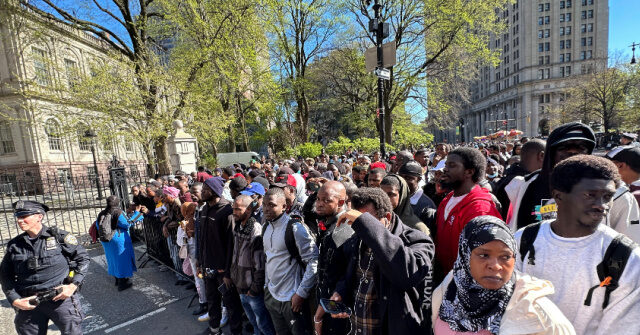A recent Marist poll reveals that nearly two-thirds of registered voters, specifically 59%, support the deportation of all illegal migrants, a stark shift from views held just months prior in March 2024 when support was only at 51%. This finding aligns with other surveys, such as those from YouGov and Harvard-Harris, emphasizing a growing consensus among mainstream voters regarding the enforcement of existing immigration laws intended to protect American workers from unfair competition posed by illegal labor. The demographic breakdown of the Marist poll suggests that deportation of all illegal migrants garners broad support across various racial and age groups, indicating that concern over illegal immigration transcends traditional political and social boundaries.
Interestingly, there exists a significant divide in support for deportation between different educational backgrounds. A notable 70% of white voters without a college education favor deportations, contrasting sharply with only 48% of their college-educated counterparts who support the same. This 22-point gap highlights a class-based disparity in opinions on immigration, revealing how individuals economically impacted by migration tend to favor stronger enforcement of immigration laws, while those who may benefit from access to cheap labor exhibit more lenient views. This phenomenon underscores the broader class divide in America, with many ordinary workers feeling the brunt of economic pressures intensified by the influx of low-cost labor.
The narrative presented by media outlets frequently prioritizes the experiences of college-educated individuals and professionals, often neglecting the ramifications faced by their working-class peers. Reports from Bloomberg, for instance, detail how the American labor market has been influenced adversely by foreign nationals who gain competitive advantages through educational avenues crafted by government policy. This obfuscation by mainstream media diminishes recognition of the challenges faced by American graduates who find themselves sidelined in industries increasingly populated by migrants pursuing work permits and high-paying jobs in prestigious firms.
Ideological influences on college graduates significantly contribute to the prevailing liberal stance on immigration policies. Many of these individuals, having been shaped by progressive educational frameworks, remain largely disconnected from the struggles of working-class Americans grappling with the realities and consequences of increased immigration. This disconnect fosters a sense of disdain among some college graduates toward voters favoring strong immigration enforcement, often associating them with right-wing sentiments. Consequently, this divergence in attitudes is reflected in the political landscape, where a mere 32% of Democrats support deporting all illegal migrants, in stark contrast to the overwhelming majority of Republicans, 89% of whom favor such action.
Independent voters, integral in determining election outcomes, are similarly leaning toward immigration enforcement, with a significant portion supporting deportation policies. Figures indicate that 26% of independents strongly support deportations, illustrating that migration remains a contentious issue capable of swaying voter sentiment. Prominent political figures, including President Donald Trump and Senator JD Vance, have utilized rhetoric surrounding the effects of illegal immigration on crime, housing, and wages to appeal to this critical voter demographic. By framing deportation as beneficial for American workers striving for decent wages, these politicians aim to resonate with a populace increasingly concerned about economic equity and job security in the face of immigration challenges.
While a considerable faction of the population rallies for stricter immigration measures, the economic ramifications of such policies often enrich certain elites—business owners and investors—who benefit from an influx of cheap labor. This creates a complex dynamic where the financial gains from immigration are used to justify a more extensive pro-immigration agenda, cloaked in progressive ideals of equity and diversity. Prominent leaders, such as former President Barack Obama, have articulated aspirations for a diverse democracy, positioning the U.S. as a case study for inclusivity on a global platform. However, the underlying disparities in public sentiment towards those advocating for broader immigration policies highlight an ongoing tension between elite interests and the everyday American worker grappling with economic challenges exacerbated by immigration influxes.
In conclusion, the shift in voter sentiment from March 2024 to the present, as depicted in the Marist poll, reveals a growing insistence among mainstream Americans for stricter immigration enforcement. This surge in support, driven by palpable economic concerns and a prevailing sense of disconnect between classes, underscores the complexities inherent in U.S. immigration policy debates. The dynamic interplay between public opinion and political rhetoric illustrates the substantial influence that migration issues wield over the modern electoral landscape, ultimately reflecting deeper societal divisions that transcend mere policy discussions. With independent voters playing a pivotal role in shaping election outcomes, the urgent call for accountability on immigration issues will remain a significant factor influencing the broader political discourse in the years to come.

